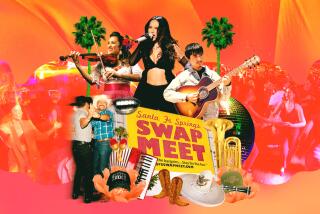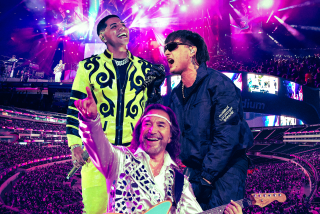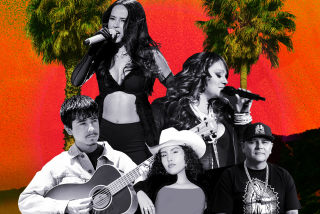POP MUSIC REVIEW : Ronstadt Dazzles Hometown Crowd
- Share via
TUCSON — If ever there was a place to hear Linda Ronstadt sing in Spanish, her hometown would have to be it. At least that was the feeling of many fans who approached Centennial Hall here Friday under a sky cleared by a cool desert breeze.
Ronstadt didn’t disappoint them, bringing a bit of the night’s magic into the 2,450-seat concert hall on the University of Arizona campus. The singer, who had explored country-rock, mainstream rock ‘n’ roll and classic pop previously during her 20-year career, hit town with a full-blown musical based on her 15th gold album, the Spanish-language “Canciones de mi Padre” (“Songs of My Father”).
It had been seven years since the 41-year-old singer had graced Tucson with a full-length concert.
The real core was the evening’s unique blend of Ronstadt’s artistry, the dazzling production and the sense of family reunion. Near and distant relatives, close friends, Latinos and Anglos gathered to recognize a shared Mexican heritage.
“It’s going to be good for the Hispanic culture here,” predicted Roberto Silvas, 72, before entering the hall. Yes, Silvas said, Ronstadt’s success was cause for pride. But, as a descendant of Mexican-German settlers who helped found Tucson a century ago, Ronstadt also embodied a city’s ethnically intertwined history.
“It’s what I’ve been tracing for some time,” Silvas said. “These are the mestizo (mixed) roots so many of us have here.” Recently, he said, this sense of place has been taken for granted as Tucson has become one of the Southwest’s fastest-growing cities.
As the first act began, it became apparent that Ronstadt wasn’t taking the songs that she learned from her father, Gilbert, for granted either.
Directed by Michael Smuin, with sets designed by Tony Walton and featuring new songs and vocal pairings with Daniel Valdez, “Canciones” had the feel of a Broadway spectacle and a 1920s tanda --a bawdy Mexican music hall revue--rolled into one.
Elegant in a long, black, silver-embroidered charra’s (horsewoman’s) skirt, Ronstadt opened with “Los Laureles” (“The Laurels”), a song made famous by her idol, Lola Beltran. Leaning back slightly, hands on her hips, she brazenly let go, attacking the lyrics with an intensity any self-respecting ranchera (Mexican country) singer would have admired.
Few if any singers born outside Mexico have infused such freshness into a tradition that’s been gradually degraded by other brands of popular music, and the backing of the Mariachi Vargas Tecalitlan showed why the group is widely considered the world’s best.
After her first number, Ronstadt stopped to honor a friend in the audience--Maria Urquides, a 79-year-old teacher whom the singer credited for the lobbying drive that created the nation’s first bilingual education bill in the early ‘60s.
Midway through the first act, Ronstadt and Valdez rolled onto the stage, grandly perched on a huge, cartoonish locomotive as they harmonized corridos (story-ballads) from the Mexican Revolution.
The second act’s highlights included Ronstadt’s arresting performance of “El Crucifijo de Piedra” (“The Crucifix of Stone”), a huapango of intricate counter-rhythms and haunting falsettos.
Yet, despite dazzling sets and costumes, there were absences. Competent performances by a folk-lorico troupe were dulled by a floor that deadened their heel-work. And Ronstadt, who seems to have further honed her Spanish, nonetheless had trouble staying atop the rapid-fire syllables of “La Charreada,” an earthy dance-style son about bull riding.
These were minor flaws in a show that ended with endearing duos and trios that Ronstadt shared with her brothers, Peter and Mike, her sister, Suzy Jacome, and her father.
“Canciones” begins a five-concert run on Wednesday at the Universal Amphitheatre.
More to Read
The biggest entertainment stories
Get our big stories about Hollywood, film, television, music, arts, culture and more right in your inbox as soon as they publish.
You may occasionally receive promotional content from the Los Angeles Times.








